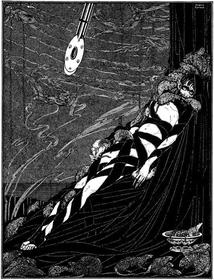Our editor-in-chief Nate Yapp is proud to have contributed to the new book Hidden Horror: A Celebration of 101 Underrated and Overlooked Fright Flicks, edited by Aaron Christensen. Another contributors include Anthony Timpone, B.J. Colangelo, Dave Alexander, Classic-Horror.com's own Robert C. Ring and John W. Bowen. Pick up a copy today from Amazon.com!
Cold Reads: The Pit and the Pendulum by Edgar Allan Poe
Cold Reads celebrates Writer of the Month! Throughout August, we will be studying the works of Edgar Allan Poe and celebrating his massive contributions to the horror genre.
Well, I didn't expect a kind of Spanish Inquisition! *Diabolical music* No one expects the Spanish Inquisition! This week's creepy classic is Poe's immortal "The Pit and the Pendulum," a devilish descent into the tortures of the Inquisition minus the soft pillows and comfy chair of Monty Python's hilarious skit. Poe drenches his short tale in a palpable sordidness that will instill a bad taste in the reader's mouth and a tangible shiver in the skin.
Our narrator is on the brink of unconsciousness, given to swooning at random intervals at the thought of his horrid fate. Brought before the shadowy judges of the Inquisition, the man's sentence is determined and he is dragged into an ethereal darkness. Upon awakening, the prisoner discovers he has been locked away in a squalid dungeon and nearly plummets to his death in a yawning pit. The narrator's troubles only heighten when he is next tied to a rack and forced to watch the hair-raising descent of a wicked blade from the ceiling. With the ravenous rats crawling at his feet and the instrument of torture coming ever so close, the prisoner must find a way to escape the grinning face of Death that moves in on him from every corner...
"The Pit and the Pendulum" is one of Poe's most atmospheric tales. He uses the senses of the narrator (and we the readers) to increase the terror of the man's ghastly predicament. When the prisoner first awakens to find himself in utter darkness, his fear reaches incredible heights. He says it is worst to be lost in the blackness than to see the full luridness of his tortures. The lack of sight and direction is unsettling. Without it the prisoner is a man at the mercy of a greater power whom he cannot give a face to and whose will he must obey like the most obedient, blind servant.
Not to say that things get better when the narrator finally does see where he is exactly. Whereas before Poe emphasized the dark mood of the tale by having the narrator lost in shadows, he illustrates the full horridness of the torture chamber in stark clarity. While the pit remains an abyss of mystery and shadow, the rest of the torture devices are in full, glaring light. We see how repulsive the filthy vermin are as they scamper about the dungeon in their search for meat. The prisoner's hopelessness is only enhanced by the constriction of the straps that hold him practically immobile on the rack.
But worst of all is the swinging pendulum itself. It seems to represent the full horror of the Inquisition in its power and lethalness. The torturers allow the prisoner to watch in perfect agony the descent of his means of demise. The reader may find themselves squirming at each mighty swing of the blade, dreadfully anticipating the moment when it is to make its final, deadly slice. Poe milks this moment of every last terrifying drop. The narrator at first imagines the climax of his plight when the pendulum will finally cut away his flesh and slowly make its way to his heart. We are left with this gruesome picture in our minds during the entire scene, and it only becomes clearer and more vivid as the end seemingly draws near.
Without giving too much away, the narrator's escape from the pendulum is ingenious in its usage of the surroundings to his advantage. This brief moment of brilliance seems to be snuffed out immediately afterwards. When their dastardly plans go awry, the torturers resort to flaying the prisoner alive by using the dungeon's metallic walls to turn it into a virtual oven. Pushed to the brink of his senses and resorting to throw himself into the pit, the man is suddenly saved by General Lassalle of the French army whose forces have just invaded the land to vanquish the Inquisition. This ending didn't really sit right with me. I felt it was much too similar to a happy Hollywood ending with everything tied up in a bright, superficial bow. I would have much preferred to see the prisoner exercise his cunning to make another inventive escape. I felt like I was watching a gangster movie where the hero is suddenly saved by the arrival of the police or a monster film that has the Army showing up to kill the monster in a "Hey, aren't you glad we got here?" flourish of trumpets and missiles.
The ending kind of sets a match to the dank mood and heart-wrenching suspense Poe previously built up in the story. But a true fan of the horror genre or hardcore admirer of Poe will most certainly look past this minor infraction and simply appreciate the big picture. It is one of his greatest works and deserves to be in the top five of his greatest masterpieces. So come along into the dungeon, take a stretch on the old rack, and let the master of terror grip your heart with an icy clutch that won't let go.









Excellent piece again Jose.
Excellent piece again Jose. I'm thoroughly enjoying your Poe series, and as always your writing is top notch. I can't wait for next weeks installment.